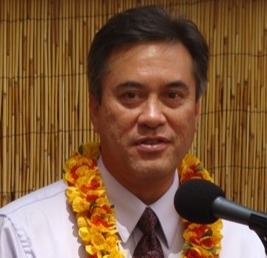The politics of public health in the time of Covid
- By Mar-Vic Cagurangan
- Mar 6, 2022
- 3 min read

Public health has often been the staple of politics and our government— regardless of the political party and no matter who is running it— always faces a great deal of public skepticism. These twin facts are magnified during the Covid-19 pandemic. It presents a distinctive occasion to speculate on the interplay between public sentiment and electoral politics.
The Guam electorate is not exactly ideologically oriented, but in a Covid-fatigued island suffocated by mandates, Republican politicians have a ready-made campaign spiel for this year’s elections.
“It’s time to restore freedom,” former two-term governor Felix Camacho said when he announced his bid to return to Adelup last month.
It’s difficult to characterize Camacho’s eight years in office. There were no major scandals that rocked the island— at least nothing that we can remember now—other than the embarrassing diplomatic blunder that involved his unsanctioned “state visit” to Taiwan.
There’s nothing remarkable about his administration either— not even his failed attempt to change “Guam to Guahan,” which he marked as his “legacy” in his last state of the island address. He seemed like a reluctant governor during his second term. While spending most of his time off-island, George Bamba, Shawn Gumataotao and Bernadette Meno were the composite faces of the government of Guam.
ADVERTISEMENT

The pandemic-stricken election year presents an opportunity for Camacho to redeem himself. It gives him a perfect keynote that comes with soundbites that appeal to emotion.
“We need to live. We need to breathe, and as human beings, we need to be together. We are social beings. We are not meant to be separated, which has led to so many social ills,” he said.
From now until the time Gov. Lou Leon Guerrero lifts the Covid restrictions, Camacho is equipped with the right words that appeal to the people’s desire for normalcy.
"The word fear is paralyzing," he said. "Every aspect of our lives is touched by big government. Throughout the nation and the world, fear has been used by governments to control our lives. It has compelled us as individuals to comply with government mandates for the vaccine, for masks, for social distancing, for isolation and for quarantine."
The Covid-19 pandemic is unique to our time (although its impact is not unique to Guam.) This public health disaster put every government across the world under pressure to respond quickly and decisively. Some governments hastily imposed strict lockdown policies to curb case numbers. Others settled for loose policies to minimize the pandemic’s damage to the economy. The health-versus-economy conundrum has been a universal debate during this Covid era.
Guam is no exception. There were no similar public health disasters that befell former governors in the past to would allow us to make a comparative evaluation of Leon Guerrero’s performance.
Did she handle the pandemic well? We looked at our neighbor-islands for answers. The CNMI managed to control community transmission and flatten the curve for eight months until October 2021 when the delta variant emerged. Palau managed to remain Covid-free for nearly two years until the omicron variant came into the picture.
Did the administration’s policies work?
As far as Camacho is concerned, the Democrats’ game plan that comes with Covid-related restrictions has not lived up to the promise that “everything will be OK.”
Guam’s death toll was 328 as of Feb. 28 and the total Covid count was 44,573, accounting for 28 percent of the island’s population. But it could’ve been worse, according to public health officials. These statistics can only be compared to a contingent scenario based on the administration’s initial (and contentious) death projection, which was 20,000. In which case, the administration can claim “policy success”— in the Orwellian sense.
We, as citizens, don’t want to take responsibility. If anything fails, the government is our default patsy.
The Covid economy is another story. It’s a paradox. Despite the shutdown of several businesses, Guam sees a booming economy on steroids. Guam has never been this wealthy—thanks to the endless flow of federal dollars. In the past two years, Guam received a total of $8 billion in federal aid and spending.
The Leon Guerrero administration may claim success in managing federal funds through local programs, although it was marred by some questionable deals.
Guam voters may put greater stock in their Covid experience when they head to the polls this year. Success will be rewarded and failures will be punished.
As is the case around the world, the incumbents are easier to discredit than the aspiring challengers who are not in the hot seats to confront the unsettling crisis.
“I can’t second guess the governor and the lt. governor because I am not in the seat when this pandemic evolves,” Camacho admitted.
This year’s gubernatorial race will determine how policy reactions translate into voting decisions.

Subscribe to
our digital
monthly edition









Comments